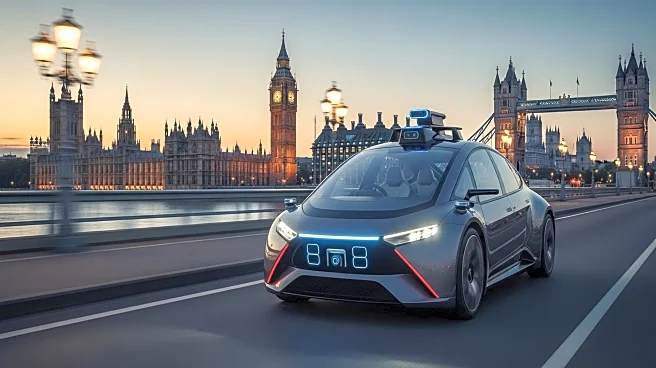What's Happening?
Waymo, a subsidiary of Alphabet, has announced its intention to launch a commercial robotaxi service in London by 2026. This marks the company's second international expansion, following its operations
in Tokyo. The announcement comes after speculation driven by job postings in London. Waymo has existing ties to the UK, having acquired Latent Logic, a startup from Oxford University, in 2019. The company plans to deploy its all-electric Jaguar I-Pace vehicles equipped with self-driving technology on London's roads in the coming weeks. Initially, these vehicles will have human safety drivers, with plans to transition to driverless testing and eventually public access. The timeline for removing human drivers and the fleet size remain undisclosed, pending UK government approval. Waymo will partner with Moove for fleet operations in London, similar to its arrangements in Phoenix.
Why It's Important?
The expansion of Waymo's robotaxi service to London signifies a major step in the global adoption of autonomous vehicle technology. This move could influence public transportation dynamics in London, potentially reducing traffic congestion and emissions through the use of electric vehicles. It also highlights the growing collaboration between tech companies and local governments to integrate advanced technologies into urban infrastructure. The success of Waymo's operations in London could pave the way for further international expansions, setting a precedent for other cities to follow suit. Stakeholders in the automotive and tech industries, as well as urban planners, will be closely monitoring the impact of this service on public transportation and city planning.
What's Next?
Waymo's next steps involve conducting driverless testing and obtaining necessary approvals from the UK government to fully launch its robotaxi service. The company will continue to collaborate with Moove for fleet management, ensuring the vehicles are maintained, charged, and cleaned. As Waymo prepares for public access, it will likely engage with local authorities and communities to address any concerns related to safety and infrastructure. The success of this initiative could lead to further expansions in other European cities, contingent on regulatory approvals and public acceptance.
Beyond the Headlines
The introduction of Waymo's robotaxi service in London could have broader implications for the future of urban mobility. It raises questions about the ethical and legal aspects of autonomous driving, including liability in the event of accidents and the impact on employment in the transportation sector. Additionally, the integration of AI-driven vehicles into public roads challenges existing traffic laws and insurance frameworks, necessitating updates to accommodate this technology. Long-term, this development could accelerate the shift towards smart cities, where technology plays a central role in managing urban environments.









